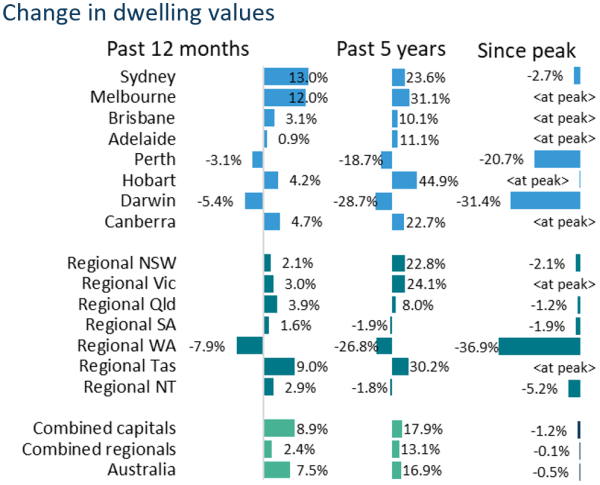
Author Credit: Tim Lawless (Core Logic)
The trend in housing values remained positive throughout March, with the CoreLogic national hedonic index rising 0.7% over the month. Although housing values continued to rise, the second half of the month experienced a weakening in the growth trend as confidence slumped and social distancing policies took effect. The national March reading emerged as the lowest monthly gain since the market lifted in July last year.

CoreLogic head of research Tim Lawless said, “Although Australia’s housing markets have begun to enter a period of disruption, they are coming from strong foundations.”
Over the month, housing values rose across every capital city apart from Hobart (which declined -0.2%), while over the March quarter, every capital city recorded a rise in housing values. Sydney had the highest growth over the quarter with values up 3.9%, followed by Melbourne at 2.9% and Canberra at 1.7%. The lowest quarterly gain was in Darwin and Adelaide, each increasing 0.6%; a similar story occurred across the regional areas of each state with values higher over the month and quarter.

However, Tim Lawless noted that recent trends in the market have become less relevant as we move into a period of unprecedented uncertainty which is likely to impact further on household confidence and drag Australia’s economy into a recession for the first time in almost 30 years.
“The housing market won’t be immune to a drop in sentiment and weaker economy, however the extent of the impact on dwelling values remains highly uncertain. Capital growth trends will be contingent on how long it takes to contain the virus, and whether additional constraints on business or personal activity are introduced.”

From a transactional perspective, Tim Lawless said, “we are expecting the number of residential property sales to fall dramatically over the coming months – a consequence of tanking consumer confidence, a rising jobless rate, and more cautious lending practices. Restrictions on open homes and on-site auctions will compound the slowdown in buyer activity, as would any future policy announcements related to peripheral services such as building and pest inspections, conveyancing and furniture removals.”
“Considering the temporary nature of this crisis, along with unprecedented levels of government stimulus, leniency from lenders for distressed borrowers and record low interest rates, housing values are likely to more be insulated than sales activity,” said Mr Lawless.
He said, “The extent of any fall in housing values is impossible to fathom without first understanding the length of time this health and economic crisis persists. Arguably, the longer it takes to contain the virus and bring economic operations back to normal, the higher the downside risk to housing values.”
